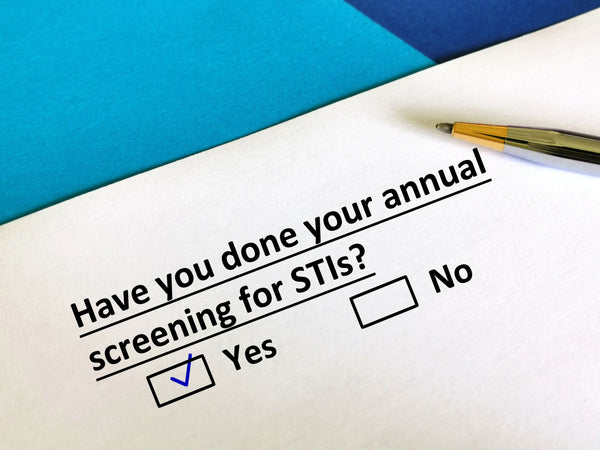Condoms are a fantastic way to prevent the spread or acquisition of sexually transmitted infections (STIs) and unintended pregnancy. When used properly, condoms are 98% effective in preventing STIs and pregnancy, but humans aren’t perfect, so in reality, the rate is closer to 85%. However, that 85% rate includes common (and very preventable!) condom use errors, such as using improper lube with a specific condom material (e.g., using oil-based products on a latex condom), putting on the condom in the middle of a sexual experience, or not checking the expiration date. This is why information around how to use condoms consistently AND correctly is an essential part of sex education and STI prevention.
While condoms significantly reduce the risk of many STIs, such as chlamydia and gonorrhea, there are some, such as herpes, genital warts, and syphilis, which can spread from skin-to-skin contact that the condom does not cover. No matter how great of a condom user a person is, a comprehensive STI screening is essential to know your status (and get treatment!) before they turn into major health concerns. While personal responsibility is our first concern, regular STI screenings extend well beyond your own health. By taking care of yourself, you are proactively contributing to the larger public health effort to reduce the overall prevalence of STIs. Read some of the latest HIV stats from CDC on our blog.
Why Early Detection Matters
It might seem obvious, but the sooner you are exposed to an STI, the easier it is to treat. Unfortunately, not all STIs let you know they’re there. Some, like genital herpes, can be present in your body for years without any noticeable symptoms, only to later turn into a painful outbreak. Others, like chlamydia and gonorrhea, might have subtle signs initially, but if left unchecked, they can cause serious reproductive complications. Certain strains of human papillomavirus (HPV) can cause cervical cancer or complications like pelvic inflammatory disease. Early detection of STIs is pivotal in preventing life threatening conditions and further transmission within communities. By promptly identifying and treating infections, individuals can significantly reduce the risk of spreading infectious diseases to their partners or other community members while taking care of their own sexual health needs.

Testing is for Everyone
Regular STI screenings are the ultimate safeguard in sexual well-being for anyone sexually active. It doesn’t matter if you are single, in a relationship, or even pregnant, STI testing is vital to staying healthy. As we discussed above, some STIs are almost symptomatic. Others, like syphilis or HIV, can be passed on to a baby during childbirth so many obstetricians and health care providers will check for STIs as a part of prenatal screenings. It is recommended that anyone sexually active goes for a STI test at least once per year.
What is a Full STD Panel?
The Centers for Disease Control and Prevention (CDC) has different testing recommendations for groups depending on age, gender, number of sexual partners, types of sex (oral, anal, vaginal), and other risk factors. Consulting with your healthcare provider about your own sexual and medical history can help determine the scope of your screening. Since each STI has its own testing method, a screening may include a urine sample, oral swab, blood test (prick or draw), physical exam, sore/blister swab, and/or genital swab. A full STD panel should include:
- HIV (human immunodeficiency virus)
- Chlamydia
- Gonorrhea
- Herpes (HSV)
- Syphilis
- HPV (crucial for cervical cancer prevention)*
- Trichomoniasis
Some results are immediate, like with a rapid HIV test, but others might take a few days or weeks to come back from the lab.
*There is no approved penile or scrotal testing for HPV but the CDC doesn’t recommend regular HPV screenings for people with penises unless there are signs or symptoms. People who have a high risk of anal cancer, including people with HIV or those who receive anal sex, should talk to their health care provider about an anal Pap.
Where can you get tested?
Most doctors offices, clinics, college health centers, health departments, and Planned Parenthoods offer STI testing. Depending on what you're testing for, health insurance status, and income, STI screenings can cost anywhere between $0-$250. Luckily, the CDC maintains a comprehensive database that can help find local and affordable testing options.
When it comes to your sexual health, proactive measures and preventative services are always the best course of action. Regular STI screenings serve as the cornerstone of responsible sexual health management for you and your community. In the pursuit of a healthier and more resilient society, the importance of regular STI screenings cannot be overstated.
Want more info? Check out these resources for more information:
Verywell Health: Five Reasons to Get Tested for STDs https://www.verywellhealth.com/five-reasons-everyone-should-get-tested-for-stds-3133081
Planned Parenthood's Guide to Getting Tested https://www.plannedparenthood.org/learn/stds-hiv-safer-sex/get-tested